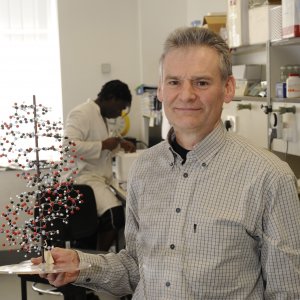
The Maxwell lab investigates the structure and mechanism of DNA topoisomerases and associated proteins.
Tony is working to further our understanding of key biological processes in which they are involved, and to harness this knowledge for the development of therapeutic agents, specifically antibiotics.
This work is carried out within the Molecules for Nature Institute Strategic Programme, under Theme 2: Biological Context.
DNA topoisomerases are vitally important enzymes involved in the control of the topological state of DNA. Their major biological functions are in DNA replication, transcription and the control of gene expression.
Topoisomerases provide fascinating systems for studying DNA-protein interactions and energy coupling in biological systems. Their study also has clinical relevance from the standpoint of antibacterial and anti-tumour drugs.
DNA gyrase, the enzyme from bacteria that carries out DNA supercoiling, is the target for clinically-important antibiotics, such as the fluoroquinolones.
In addition to gyrase, we are working on several related enzymes, including bacterial topoisomerase IV and the recently-discovered gyrases and topo VI enzymes from plants and plasmodial species. The work involves a wide range of methodologies including bacteriology, mutagenesis, protein engineering, plant molecular biology, enzymology, biophysical methods and X-ray crystallography and cryo-EM.
Tony is an Honorary Professor at the University of East Anglia.
Selected Publications
-
Allen AMB, Maxwell A (2024)Phylogenetic distribution of DNA topoisomerase VI and its distinction from SPO11.NAR genomics and bioinformaticsPublisher's version: 2631-9268
-
Morgan IL, McKie SJ, Kim R, Seol Y, Xu J, Harami GM, Maxwell A, Neuman KC (2024)Highly sensitive mapping of in vitro type II topoisomerase DNA cleavage sites with SHAN-seq.Nucleic acids researchPublisher's version: 0305-1048
-
Germe TRM, Bush NG, Baskerville VM, Saman D, Benesch JLP, Maxwell A (2024)Rapid, DNA-induced interface swapping by DNA gyrase.eLifePublisher's version: 2050-084X
